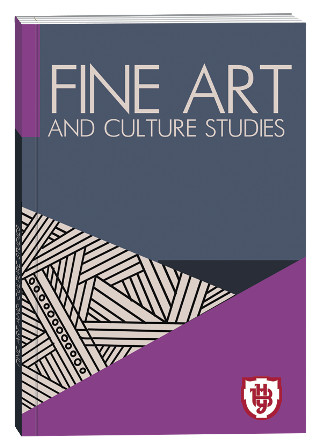INTEGRATION OF DIGITAL TECHNOLOGIES INTO THE PROFESSIONAL TRAINING OF FUTURE MUSIC TEACHERS
DOI:
https://doi.org/10.32782/facs-2025-3-1-13Keywords:
integration, digital technologies, music education, digital competence, artificial intelligence, multimedia resources, interactive learningAbstract
The article examines the process of digital transformation of professional training of future teachers of music in the conditions of modern education. The purpose of the study is to analyze digital platforms, tools and methods that are integrated into the educational process in the specialty “Secondary Education (Music)”, as well as to identify the advantages and challenges of their implementation. The key areas of digitalization are considered: modernizationof educational programs, technical support, development of digital competence of teachers, practical application of digitaltechnologies and reflection of the educational process. Particular attention is paid to the use of artificial intelligence, digital audio workstations (DAW), multimedia platforms, as well as tools for distance learning and assessment. The purpose of the study: to analyze modern digital platforms and tools used in the training of bachelors in the specialty “Secondary Education (Musical Art)”, to identify the advantages and difficulties of their implementation in the Ukrainianeducational space.The purpose of the study: to analyze modern digital platforms and tools used in the training of bachelors in the specialty“Secondary Education (Musical Art)”, to identify the advantages and difficulties of their implementation in the Ukrainianeducational space.Methodology. The work uses a theoretical method, analysis and generalization of results. At the same time, a systematic and competency-based approach to writing the article was applied.Scientific novelty. The study highlights the process of integrating digital technologies into the professional training of future teachers of musical art in a modern way, justifying the combination of traditional education with digital technologies.Conclusions. The introduction of digital technologies into the educational process is a key vector of transformation of the modern educational process and the system of training future teachers of musical art. The process of integrating digital technologies into education contributes to the formation of digital competence and awareness in students, which helps to reveal their creative potential and the ability to interpret musical works in a new way, create new compositions, personalizes learning and promotes self-realization of students. A new educational model that combines traditional teaching methods with digital technologies is the basis of deep knowledge, competence of students in their future profession.For teachers, such a combined approach to teaching requires self-improvement, a new vision of the educational process, increasing their professional level and acquiring new competence in teaching.
References
Brooks C. Effective Feedback in Higher Education [Електронний ресурс]. University of Queensland, 2022. URL: https://libretexts.org/Feedback
Buchborn T., Treb J. Acting self-determinedly and critically in a post-digital future? A critical review on digitalisation in music education. Culture, Education, and Future. 2023. Vol. 1 (1). P. 66–82.
Cuervo L., Bonastre C., Camilli C., Arroyo D., García D. Digital Competences in Teacher Training and Music Education via Learning Services: A Mixed-Method Research Project. Education Sciences. 2023. Vol. 13 (5). Art. 459.
Данилюк М. М. Вимоги до створення відеозаписів виконання музичних творів у процесі підготовки до підсумкового контролю : метод. рек. Харків : ХНПУ імені Г. С. Сковороди, 2025. 28 с.
Демиденко О. Як зробити аранжування: повний гайд для новачків і профі [Електронний ресурс]. Retro.ua. 14 червня 2025. URL: https://retro.ua/yak-zrobyty-aranzhuvannya-povnyj-gajd-dlya-novachkiv-i-profi/
Держмистецтво України. Підвищення кваліфікації педагогічних працівників [Електронний ресурс]. URL: https://arts.gov.ua/misteczka-osvita/pidvyshhennya-kvalifikacziyi/
Ed-Space. Пропозиції щодо покращення освітнього процесу [Електронний ресурс]. URL: https://ed-space.org/propoziciyi-shodo-pokrashennya-osvitnogo-procesu/
Кадемія М. Ю. Інформаційно-комунікаційні технології в професійній освіті майбутніх фахівців : монографія за ред. Р. С. Гуревича. Львів, 2020. 380 с.
Калінська Я. Ю. Використання технологій дистанційного навчання на уроках музичного мистецтва: презентація [Електронний ресурс]. На Урок. 2024. URL: https://naurok.com.ua/prezentaciya-vikoristannya-tehnologiy- distanciynogo-navchannya-na-urokah-muzichnogo-mistectva-202474.html
Кузьмічов С., Кузьмічова І., Кузьмічова Д. Інновації в музичній освіті [Електронний ресурс]. URL: http://dspace.pnpu.edu.ua/bitstream/123456789/26242/1/9.pdf
Mandanici M., Spagnol S., Ludovico A., Baratè A., Avanzini F. Digital Music Learning Resources. From Research to Educational Practice. Singapore : Springer, 2023. 98 p.
Мельник Х. П. Формування професійної компетентності майбутніх учителів музичного мистецтва засобами цифрових технологій в сучасній науці і практиці. Педагогічна Академія: наукові записки. № 14. 2025. 275 c.
Ніщик О. ШІ не замінить людей. Але люди, які користуються ШІ, замінять тих, хто не користується [Електронний ресурс]. Diia. City United. 2025. URL: https://diiacityunited.org/shi-ne-zaminyt-liudej-ale-liudy-iaki-korystuiutsia-shi-zaminiat-tykh-khto-ne-korystuietsia-holovne-z-blits-paneli-5-krokiv-dlia-rozvytku-shtuchno-ho-intelektu-v-ukraini-na-futuretech-pro-shtuchnyj-inte/
Олійник Ю. І. Інформаційно-комунікаційні технології в музиці: цифрові музичні інструменти [Електронний ресурс]. Херсон : ХДУ, 2013. URL: https://ekhsuir.kspu.edu/bitstreams/2e86e1e8-70e2-43b6-84ba-742dccc6d4f3/ download
Онлайн-курси для вчителів музичного мистецтва [Електронний ресурс]. На Урок. URL: https://naurok.com.ua/upgrade/kursy-dlya-vchyteliv-muzychnoho-mystetstva
Özer Z., Demirbatır R. E. Examination of STEAM-based Digital Learning Applications in Music Education. European Journal of STEM Education. 2023. Vol. 8 (1). Art. 02.
Saienko V., Kurysh N., Siliutina I. Digital competence of higher education applicants: new opportunities and challenges for future education. Futurity Education. 2022. Vol. 2 (1). P. 37–46.
Спірін О. М. Інформаційно-комунікаційні та інформатичні компетентності як компоненти системи професійно-спеціалізованих компетентностей вчителя інформатики. Інформаційні технології і засоби навчання. 2009. № 5 (13). URL: http://eprints.zu.edu.ua/3733/2/09somtio.htm
Спірін О., Олексюк В., Василенко Ю., Сіренко О. Модель розвитку цифрової компетенції науково-викладачів. Information Technologies and Learning Tools. 2024. Т. 104. № 6. С. 156–179.
Стець Г. В., Кишакевич С. В. Викладання музичного мистецтва в умовах цифровізації освіти. Наукові записки. Серія: Педагогічні науки. 2025. № 217. С. 183–187.
Тормахова В. М. Інноваційні підходи у викладанні сольфеджіо для джазових та естрадних музикантів. Слобожанські мистецькі студії. 2025. № 1. 312 c.
Чигирик О. А. Інформаційна система для інтерактивного навчання сольфеджіо на основі штучного інтелекту [Електронний ресурс]. Репозитарій Національного університету «Львівська політехніка». 2024. URL: https://ena.lpnu.ua/items/d0d53ede-7155-40ed-8c60-91a441e3c235
Шаламов Д. Машинне навчання як фактор розвитку сучасної музичної культури. Часопис Національної музичної академії України ім. П. І. Чайковського. 2024. № 3 (64). С. 91–107.
Шилдс Т. Що таке DAW і навіщо він потрібен [Електронний ресурс]. eMastered. 1 травня 2021. URL: https://emastered.com/uk/blog/what-is-a-daw








